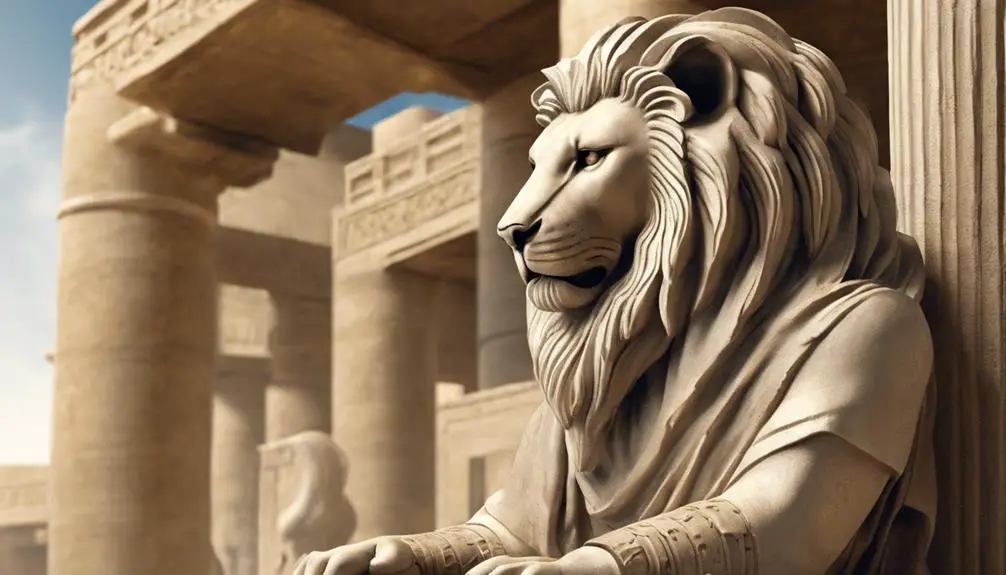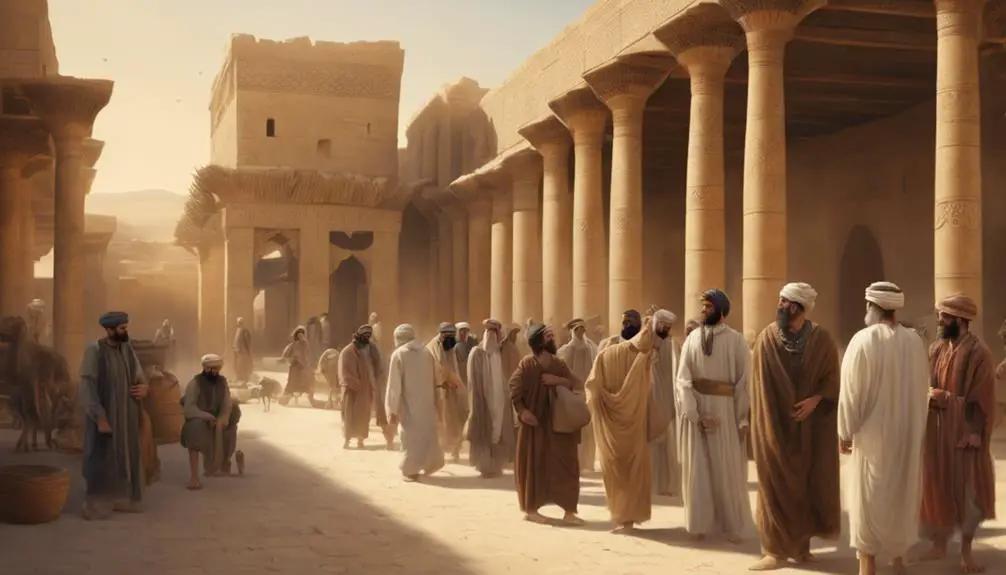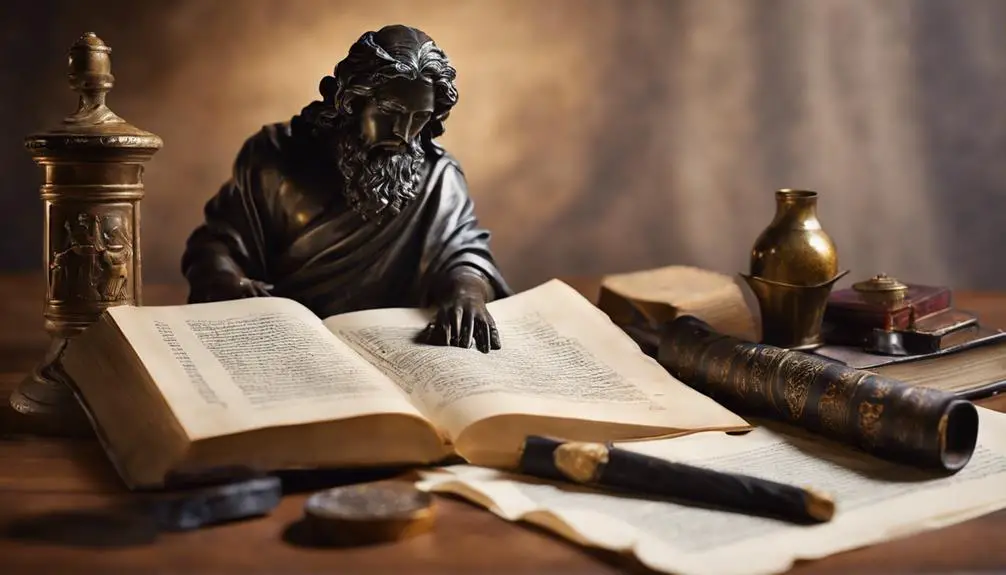Find out if Daniel was castrated in the Bible, a question that uncovers layers of history, faith, and human complexity.

Was Daniel Castrated in the Bible
Have you ever pondered the fate of Daniel, a figure shrouded in both reverence and mystery within the biblical narrative? You're not alone.
The question of whether Daniel was castrated, a practice not uncommon for those in service within ancient royal courts, has intrigued scholars and laypeople alike. This inquiry not only sheds light on Daniel's role in Babylon but also invites a deeper understanding of eunuchs in ancient societies and their depiction in biblical texts.
As we unravel the historical context, biblical evidence, and scholarly interpretations, you'll find that the answer to this question might reshape your view of this pivotal biblical figure, compelling you to consider the implications it holds for our understanding of history, faith, and the human condition.
Key Takeaways
- The Bible does not explicitly mention Daniel being castrated.
- Terms for 'eunuchs' in the Bible may symbolize a status rather than literal castration.
- Daniel's unique position could imply a eunuch's role without direct evidence of castration.
- Scholarly interpretations focus on linguistic and historical context rather than definitive proof of castration.
The Historical Context

To fully understand the question of whether Daniel was castrated in the Bible, it's crucial to examine the historical context in which he lived. Daniel's life was markedly influenced by two significant events: the fall of Jerusalem and the reign of Nebuchadnezzar. These events provide a backdrop that's essential for interpreting Daniel's experiences and potential status in Babylon.
The fall of Jerusalem to Babylonian forces marked a turning point in Judean history. This catastrophic event led to the deportation of Judean elites, including young nobles and possibly Daniel himself, to Babylon. Nebuchadnezzar's reign, characterized by its ambition to expand and consolidate the Babylonian empire, involved integrating conquered peoples, including the Judeans, into its administrative and cultural fabric.
Understanding this context is key because it sheds light on the practices of the Babylonian empire regarding captives of royal or noble blood. Such individuals were often placed in the king's service, undergoing education and assimilation into Babylonian society. The question of castration, a practice sometimes applied to ensure loyalty and prevent claims against the throne, hinges on understanding these broader historical and cultural practices during Nebuchadnezzar's rule.
Daniel's Role in Babylon
Upon his arrival in Babylon, Daniel found himself thrust into a unique position within the Babylonian court, reflecting both his noble Judean heritage and the empire's strategies for integrating elites from conquered territories. His role was multifaceted, showcasing not just his adaptability but also his profound leadership qualities. Daniel's exceptional ability in dream interpretation, a highly valued skill in the Babylonian court, set him apart and solidified his standing among the empire's elites. This expertise didn't just serve to elevate his position; it became a crucial tool in navigating the complex dynamics of Babylonian politics and religion.
Your understanding of Daniel's significance in Babylon should also recognize his leadership qualities, which were evident in his unwavering moral integrity and wisdom. Despite the challenges of living in a foreign land and under constant scrutiny, Daniel maintained his faith and principles, influencing those around him and eventually the decisions of the Babylonian rulers themselves. His role went beyond the interpretation of dreams; he became a trusted advisor, demonstrating how wisdom and faith can influence and transform even the most powerful empires.
Through Daniel's story, you're invited to explore the nuanced interactions between faith, leadership, and diplomacy in ancient societies.
Eunuchs in Ancient Societies

Understanding the role of eunuchs in ancient societies requires delving into their multifaceted positions as both marginalized individuals and pivotal figures within the administrative and domestic spheres of empires. Initially, you might perceive eunuchs solely as victims of involuntary castration, often carried out during eunuch ceremonies that marked their transition into a life of servitude. However, this perspective overlooks the complexity of their existence and the nuanced roles they played.
Eunuchs often held significant power and influence, particularly in administrative and courtly functions. Their social status, contrary to assumptions of universal marginalization, could ascend to heights unattainable by other servants or slaves. Trusted for their perceived lack of personal familial ambitions, which could threaten the throne, eunuchs were positioned in roles close to the heart of political power. They managed intricate palace bureaucracies, acted as confidants to royalty, and sometimes even served as military leaders or diplomats.
The eunuch ceremonies themselves, while marking an end to one path, also initiated a journey toward a unique societal niche. These ceremonies underscored the duality of their existence—separated from the typical family structure, yet integral to the fabric of imperial governance and court life.
Biblical Evidence Reviewed
Now let's examine the scriptural accounts to determine whether Daniel underwent castration, as the notion of eunuchs in biblical times carries implications of both servitude and influence. A close reading of Daniel's text, combined with a linguistic analysis, reveals that the Bible doesn't explicitly state that Daniel was castrated. The Hebrew and Aramaic terms used to describe Daniel and his companions in the court of Nebuchadnezzar are often translated as 'eunuchs.' However, these terms can also denote a trusted official or servant, not necessarily one who's been physically altered.
The context of Daniel's service, his rise to prominence in a foreign court, and the duties he performed suggest that his status as a eunuch might be more symbolic, reflecting his separation from typical familial and societal roles. This interpretation aligns with the overall theme of prophetic symbolism found throughout the book. Daniel's life and experiences serve as a metaphor for faithfulness and purity in service to God, transcending literal interpretations of his physical state.
Thus, while the question of Daniel's castration remains open to interpretation, the focus on linguistic nuances and prophetic symbolism provides a richer understanding of his biblical portrayal.
Scholarly Interpretations

In exploring the question of Daniel's castration, scholars diverge in their interpretations, each bringing unique perspectives grounded in historical, linguistic, and theological analysis. The debate largely hinges on textual analysis and translation discrepancies, which have led to a range of scholarly opinions on the matter.
- Textual Analysis: Experts meticulously examine the Hebrew and Aramaic texts of the Book of Daniel, seeking any linguistic clues that might suggest or refute the idea of Daniel's castration. This involves a deep dive into ancient terms and their possible meanings.
- Translation Discrepancies: Scholars debate the accuracy of various translations of key passages. Some argue that translation choices have obscured the original intent of the texts, potentially leading to misunderstandings about Daniel's status.
- Historical Context: Understanding the historical context of Babylonian practices is crucial. Researchers compare the treatment of Daniel and his companions with documented practices regarding royal servants and eunuchs of the time.
- Theological Implications: The theological significance of Daniel's potential castration is considered, with some scholars suggesting that his physical state could symbolize purity or dedication to God.
Through this analytical and respectful discourse, scholars continue to contribute to the ongoing discussion, enriching our understanding of this complex issue.
Frequently Asked Questions
How Did the Practice of Castration in Ancient Times Impact Daniel's Psychological Well-Being and Faith Journey?
You're exploring how ancient castration practices impacted an individual's psychological state and faith. Considering historical accuracy, it's vital to note that such experiences likely challenged Daniel's mental resilience. His journey, as analyzed, demonstrates a profound depth of faith and psychological strength.
Despite the lack of explicit biblical confirmation of his castration, the scholarly interpretation suggests that navigating these challenges significantly shaped his spiritual and mental well-being in a respectful, analytical manner.
Were There Any Specific Dietary or Lifestyle Changes Daniel Had to Adopt if He Was Castrated, According to Traditional Practices for Eunuchs of His Time?
Navigating through the murky waters of historical practices, if you were in Daniel's shoes and had undergone castration, you'd likely have embraced specific dietary adjustments.
Vegetarian choices would be paramount, not just for health but perhaps as a means of purification. Water consumption, too, would take precedence, ensuring your body remained cleansed and in balance.
These lifestyle shifts, deeply rooted in the practices of the time, would significantly shape your daily living.
How Did Daniel's Potential Status as a Eunuch Influence His Relationships With Other Prominent Biblical Figures and Prophets?
You're exploring how Daniel's unique position may have impacted his interactions with key biblical figures and prophets.
Given his potential status, it's possible he garnered royal favor, allowing him closer access to rulers and their decisions.
This, combined with his prophetic visions, could have influenced his relationships significantly, providing a distinct perspective and possibly enhancing his authority and respect among peers and prophets alike, despite any personal challenges he faced.
Is There Any Evidence Outside the Bible, Such as in Historical Texts or Archaeological Findings, That Supports or Contradicts the Theory of Daniel Being Castrated?
You're diving into a complex topic: the historical accuracy and archaeological evidence surrounding a biblical figure.
Interestingly, less than 1% of ancient figures have archaeological evidence directly linked to them. When examining the case at hand, it's crucial to note that historical texts and archaeological findings rarely offer direct evidence on personal details such as castration.
Your analytical exploration should respect the limited data while considering broader historical and cultural contexts.
How Have Different Religious Denominations Interpreted the Silence or Ambiguity Surrounding Daniel's Physical State, and What Theological Implications Does It Have for Their Faith Practices?
Different denominational perspectives have varied responses to the ambiguity surrounding Daniel's physical state, deeply influencing theological implications for their faith practices.
Some view it as a testament to purity and dedication, while others see it as irrelevant to faith. This divergence highlights the importance of interpretation in religious texts, where silence can be as significant as the spoken word, shaping beliefs and discussions within communities about dedication and sacrifice.
Conclusion
In conclusion, while the Bible doesn't explicitly state that Daniel was castrated, the context of his position in the Babylonian court—where eunuchs often served—suggests the possibility.
Considering eunuchs' roles in ancient societies, can we dismiss the notion, or does it add depth to Daniel's sacrifices and dedication?
Scholarly interpretations lean towards an understanding of his likely status as a eunuch, enriching our appreciation of his profound commitment and the complexities of his service in a foreign land.



Sign up